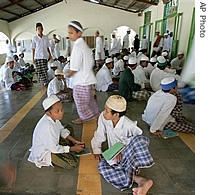2006年VOA标准英语-US Assists Indonesia with Education Reforms(在线收听)
By Chad Bouchard
Jakarta
16 November 2006
 Students chat after practicing to chant verses of the holy book of Koran at Al Mukmin Islamic boarding school in Solo, Central Java, Indonesia (File photo) |
||
-----
Tradition is a key element at this Islamic boarding school, or madrassa, in central Jakarta. Children recite a kind of nursery rhyme that commands reverence to God, and respect for parents.
Students at the Ibtidaiyah Al Ma' Muriyah madrassa also study Arabic and learn to read the Koran. But this class differs from other madrassa classrooms, and Indonesian classrooms in general. The children sit in groups around small tables, facing each other rather than the front of the class. They learn such subjects as science and math by participating in hands-on activities and group projects.
These new, modest-sounding techniques have been introduced to Indonesian teachers through a $157 million program from the United States designed to raise educational standards.
James Hope, head of the U.S.A.I.D. education office in Indonesia, is the program's director. He explains why the new classroom configuration is a departure.
"If you go to a typical Indonesian classroom, the desks are in rows. The teacher is not really facing the class, he's usually writing on the blackboard, kids are quiet, they're not asking questions, they're not working together in groups," he said. "And so they move the desks and put them into groups, so that the kids are working together using problem-solving skills."
Hope says the techniques get kids engaged in the learning process, which results in improved performance in math, science and reading. He prefers to dwell on the basic educational elements of the program, and avoids talking about a broader concern: in parts of the Muslim world, including Indonesia, some madrassas are used to teach Muslim extremism.
Indonesia has suffered several terrorist bombings in recent years, including the 2002 bombing on the island of Bali that killed 202 people. The organization behind the bombings is a Muslim extremist group called Jemaah Islamiyah, and many of its recruits have come from the country's madrassas.
Agus Dwiyanto is vice rector of Gadjah Mada University, Indonesia's largest. He says although the quality of education at Islamic schools can be very high, the largely religious curriculum can be narrow, and tends to isolate students from mainstream society.
This, he says, may leave some of them vulnerable to recruitment by terrorist groups.
"We would like to reduce the gap between the Islamic tradition's education system and the modern one. It's very much different, when we talk about the curriculum, about the teachers," said Dwiyanto. "Ah, that contributes, I believe, in the problem that now we are facing - about radicalism and so on."
Indonesia ranks low among Southeast Asian nations in accessibility to school, teaching quality, and high school graduation rates.
In 2003, the country's legislature passed an ambitious education reform law, but the reforms are expensive and difficult to implement.
For example, the country now requires a higher standard of teacher training and certification, but budgets have been threadbare over the last three years. The Indonesian constitution requires 20 percent of the annual budget to go toward education, but the allocation for 2007 is just nine-point-one percent.
Although the 2003 reform law guarantees the right to education for everyone up to the age of 15, it does not require the government to pay for it. Poverty is widespread here, and tuition and school fees can add up to more than half a poor family's yearly income. Many kids have to work to help their families survive.
James Hope says the U.S. program aims to help the country follow through with its reform plans, so that fewer students will be left behind.
"[The] enrollment rate is great for starting school - 95 percent or thereabouts. But by the time you get to junior high, only about 60 percent actually enter junior high," he said. "Of that 60 percent, only about half of them make it into high school, and then by the time you get through high school and into university, you're down and maybe five to 10 percent of those who actually started school in first grade…"
Twenty percent of Indonesia's children are taught in madrassas, but Gadjah Mada University's Dwiyanto says only about 100 of the university's five thousand new students each year are madrassa graduates. He says the madrassa curriculum does not prepare students well for degree programs, and Gadjah Mada is trying to close the gap by actively recruiting students, and training madrassa teachers.
Educators at the U.S.-supported Ibtidaiyah Al Ma' Muriyah madrassa say they are confident their students are being well prepared for higher degrees. Students' test scores have gone up since the American program began 18 months ago.
A child receives special tutoring in a small group during an Arabic reading class.
The school's headmaster, Juwaeriyah, says teacher training has helped teachers learn how to keep the students engaged.
"We really can see the positive results. We don't receive aid in the form of money, but I think the trainings and workshops are more valuable than aid in the form of money," said Juwaeriyah. "We are happy with what the program has provided at the moment, but we still hope that they can extend their assistance."
A little more than half of the U.S. program's original $157 million has been spent during the first 18 months, with assistance reaching 1,000 schools and 25,000 Indonesian educators. The five-year program is scheduled to extend through 2010, although this depends on continued funding by the U.S. Congress.
Senior Indonesian officials say when President Bush is here next week, the talks with him will include the possibility of boosting educational assistance.